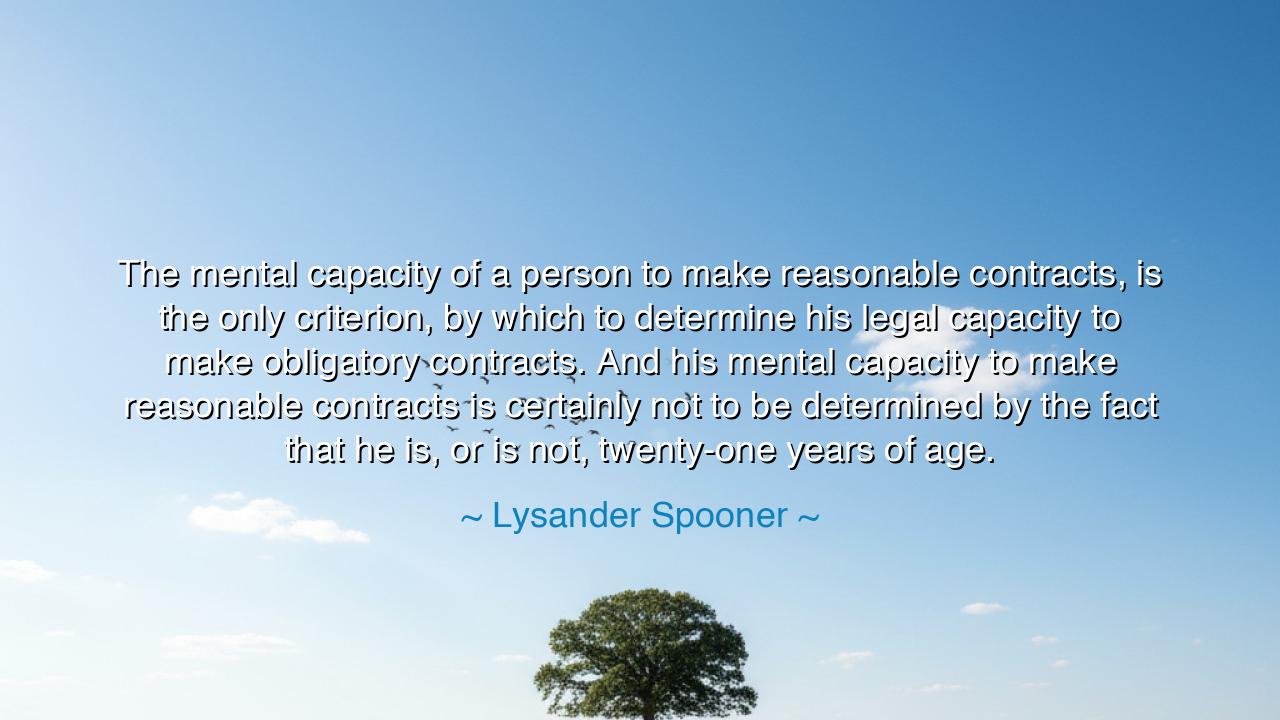
The mental capacity of a person to make reasonable contracts, is
The mental capacity of a person to make reasonable contracts, is the only criterion, by which to determine his legal capacity to make obligatory contracts. And his mental capacity to make reasonable contracts is certainly not to be determined by the fact that he is, or is not, twenty-one years of age.






Hear the words of Lysander Spooner, fiery abolitionist, radical thinker, and defender of liberty, who declared: “The mental capacity of a person to make reasonable contracts, is the only criterion, by which to determine his legal capacity to make obligatory contracts. And his mental capacity to make reasonable contracts is certainly not to be determined by the fact that he is, or is not, twenty-one years of age.” In these words shines the spirit of rebellion against arbitrary limits, the cry of one who valued reason and justice above mere tradition. Spooner, ever the champion of natural rights, reminds us that true capacity lies not in years counted, but in the powers of the mind and the will.
He speaks first of mental capacity, the ability of a human being to understand, to weigh, to decide. In his eyes, this alone should be the measure of whether one is fit to enter into contracts—agreements binding in law and morality. For what is a contract, if not the union of minds, agreeing upon terms that both understand? To deny such a right to one who possesses the reason to consent is not justice but tyranny, a chaining of liberty to the numbers on a calendar.
The age of twenty-one, to which Spooner refers, was in his time the line drawn by law to separate minors from adults. Yet he saw the folly in this. One may be twenty years old and possess wisdom, foresight, and prudence greater than many men twice his age. Another may pass twenty-one and yet lack judgment, wandering as a child in the guise of an adult. To bind all under a single number is to blind oneself to the true measure of a person’s capacity. Spooner calls us back to reason itself, not custom, as the arbiter of justice.
History confirms this lesson. Consider Joan of Arc, a girl of but seventeen years, who led armies with courage and strategic insight that seasoned captains lacked. By the law of Spooner’s age, she would have been dismissed as incapable of binding agreements, too young to command her own fate. Yet her deeds proved otherwise. Or think of Mozart, who composed symphonies as a child that continue to stir the world. Would we say his mind was unfit to make decisions of consequence, simply because he had not reached twenty-one? The folly of such reasoning is clear.
The deeper meaning of Spooner’s teaching is that rights must rest upon reality, not arbitrary tradition. Law must look to truth, not convenience. If one has the capacity to reason, to weigh consequences, and to consent knowingly, then one has the natural right to bind oneself by agreement. To deny this is to deny the dignity of reason itself. His words echo with the larger spirit of his life: that governments and societies often use false standards to withhold rights from the people, whether it be age, race, or station. And against this, he lifted his voice like a trumpet of liberty.
What lesson, then, must future generations take? It is this: beware of standards that are set without regard to truth. Numbers alone cannot measure the worth or the capacity of a human soul. Look instead to reason, to understanding, to judgment. Whether in contracts, in politics, or in the rights of citizenship, do not bind liberty to mere symbols. Let fairness be your guide, and let every person be judged by their true ability, not by arbitrary lines drawn for the convenience of rulers.
And to you, listener, I say: honor the power of the mind wherever it is found. Respect the reasoning of the young when it is wise; be wary of the folly of the old when it is clouded. Demand laws that recognize capacity in truth, not in tradition alone. Teach your children that freedom is not granted by birthdays, but by the dignity of their reason. For in the end, Spooner’s words remind us that liberty is the natural right of all who possess the capacity to claim it—and that justice must be bound not to age, but to understanding.
Thus let Lysander Spooner’s teaching endure: reason, not custom, is the measure of capacity. Let this wisdom guide your laws and your lives, that liberty may be preserved not in numbers, but in truth.






AAdministratorAdministrator
Welcome, honored guests. Please leave a comment, we will respond soon